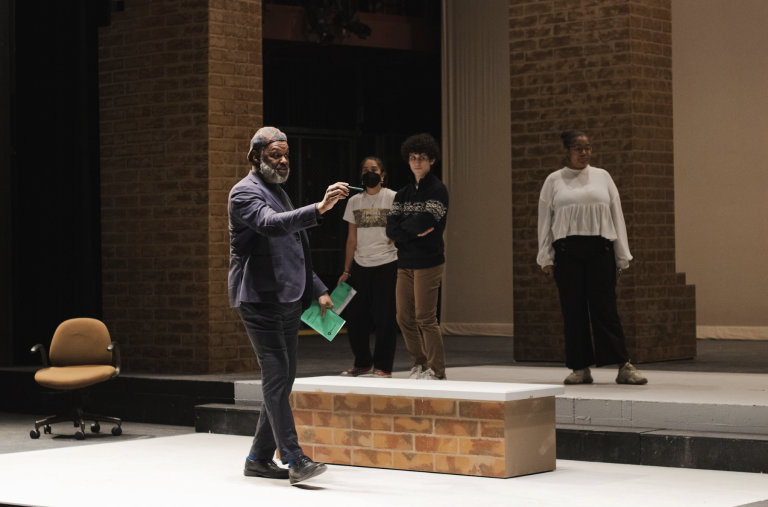Olivia Silvey ’25
Editor-in-Chief
Trinity’s most recent production of Rodgers & Hammerstein’s “Cinderella” is more than the classic rags to riches story we’re familiar with. In this interpretation, directed by Michelle Ong-Hendrick, we can’t help but root for the sweet and still-naive love between Prince Topher (Ben Rushton ’25) and Ella (Sydney Yu ’25), but at the same time, socio-political undertones provide a more grounded, relatable story.
The plot remains similar to the “Cinderella” we all know: Ella is forced to work for her selfish stepfamily after her father’s death, but makes it to the royal ball with the help of her fairy godmother to ultimately find love with the prince. However, with this production being based on the book by Douglas Carter Beane (which first premiered in 2013), there were some new characters that added life to the story: Jean-Michel (Brayden Esler ’27), a young man fighting for the working class while smitten with stepsister Gabrielle (Lily McMahon ’24); Sebastian (Steven Shen ’25), the prince’s corrupt authoritarian advisor and his chummy right-hand Lord Pinkleton (Nordelis Vega ’27); and Crazy Marie (Savannah Brooks ’26), introduced as a senile old lady who turns out to be the Fairy Godmother. Knowing the original story, it was refreshing to see a “Cinderella” with a bit more depth, while incorporating a sense of humor.
The use of original songs composed by Rodgers and Hammerstein kept the much-needed original story feel, with many cast members delivering top-tier vocals (which is not a coincidence, given that most of the cast belongs to various acapella groups on campus). During intermission, I overheard a nearby audience member exclaim, “Can we all agree that the prince has a VOICE?!” Rushton’s clear voice matched Yu’s sweet yet strong one, and was hilariously contrasted by brash vocals from stepsisters Gabrielle and Charlotte (Jensine Wagner ’25). The ensemble (Bella Chirkis ’27, Mary East ’27, Kenna Harrison ’26, Katama Hazelton ’26, Jade Mellitz ’26, Lily Mellitz ’26 and Amanda Rivera ’27) provided an expressive backdrop in songs, line delivery and blocking. Wagner as Charlotte was an especially standout performance, hitting the perfect bratty tone in her lines and rolling her eyes at just the right moments, all while commanding the stage in song. The excitement from the audience whenever she would enter the stage was evident, and for good reason.
While the actors and songs carried the performance, “Cinderella” could have accomplished much more in terms of its set and sound. The forest-green mobile panels used throughout the production were versatile — sometimes a forest, house or castle — but their layout made certain scenes spatially confusing, such as when Prince Topher is being chased by hordes of women at the ball. Some scenes included lines or plot points that failed to match with the actual set, such as when Cinderella appeared at the masked ball… without a mask. This was after the audience had to flex our imaginations as Cinderella left for the ball in the carriage, which was the two horses carrying wheels.
Soundwise, I wish the microphones had been properly on and off at the right times; there were more than a few scenes where I (and the rest of the audience) completely missed an important line, missing out on a chance to giggle or “ooooh.” With this in mind, I found it interesting that Trinity decided to outsource the sound technician rather than recruit students. Luckily, the production was chock-full of audience reaction, even with a few lines missed. Madame (Grace Fangmann ’26) garnered the most laughs, perfectly executing the mannerisms of the ridiculously cruel stepmother (while performing with a sprained shoulder from that day’s matinee showing). Shen as Sebastian also elicited plenty of cackles (“One person, one vote? Where’s the fun in that?”), and by simply appearing on stage, Brooks as Marie induced wild applause (after the show, I heard multiple people harken her as “mother”).
Another moment that captured the audience was when Cinderella appeared in the beautiful silver gown that suited her perfectly; the audience was even more agape when she took her glass slipper the first time she ran from the prince. I only wish that the final dress, white and allegedly made out of rags, would have topped the first — the audience seemed hesitant to “ahhh” at the latter.
Ultimately, in this production of Cinderella, everyone on stage had their “moment,” whether it was a witty line delivery or a pure high note held (or both). The show maintained a strong balance between classic and contemporary, and seemingly left us all with not one, but two burning questions: where can I find the Prince Topher to my Cinderella? And, when is the revolution? (One that doesn’t end with an unelected monarchy staying in power, though.)




[…] several departmental productions. This includes playing Ella in Trinity’s recent adaptation of “Cinderella,” being Chorus Leader and Head of the Society of “Futurity,” Laertes in “Hamlet” and […]